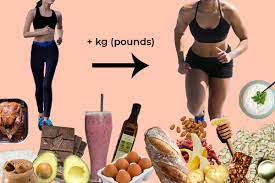Increase Caloric Intake: Aim to consume more calories than your body burns each day. You can calculate your basal metabolic rate (BMR) and add extra calories to it. This surplus will provide your body with the energy it needs to build muscle and gain weight. However, avoid excessive calorie intake as it can lead to unhealthy weight gain.
Eat Calorie-Dense Foods: Focus on nutrient-rich, calorie-dense foods such as nuts, seeds, nut butters, avocados, dried fruits, whole milk, cheese, yogurt, lean meats, and healthy oils like olive oil. These foods pack a lot of calories into small servings.
Frequent Meals and Snacks: Aim to eat every 2-3 hours throughout the day to ensure you're consistently providing your body with energy. Include snacks between meals, such as nuts, protein shakes, or yogurt with fruit.
Increase Protein Intake: Protein is essential for muscle growth and repair. Include protein-rich foods in every meal, such as lean meats, poultry, fish, eggs, dairy products, legumes, tofu, and protein shakes.
Strength Training: Engage in regular strength training exercises to build muscle mass. Focus on compound exercises that target multiple muscle groups, such as squats, deadlifts, bench presses, rows, and overhead presses. Aim to lift heavy weights with proper form and gradually increase the intensity over time.
Limit Cardiovascular Exercise: While cardiovascular exercise is important for overall health, excessive cardio can burn a lot of calories, making it harder to gain weight. Limit your cardio sessions and focus more on strength training.
Stay Hydrated: Drink plenty of water throughout the day to support muscle function and overall health. Dehydration can affect your performance and recovery during workouts.
Get Adequate Rest: Ensure you're getting enough sleep each night to support muscle recovery and growth. Aim for 7-9 hours of quality sleep per night.
Monitor Progress: Keep track of your weight and measurements regularly to monitor your progress. Adjust your calorie intake and workout routine as needed based on your goals and results.
Remember to approach weight gain in a healthy and balanced manner, and consult with a healthcare professional or registered dietitian if you have any concerns or specific dietary needs. Rapid weight gain can be harmful to your health, so prioritize gradual and sustainable changes.






nice news for me
ReplyDelete